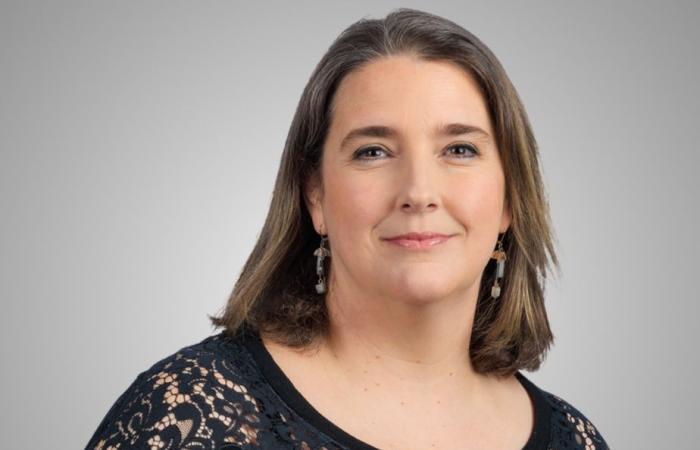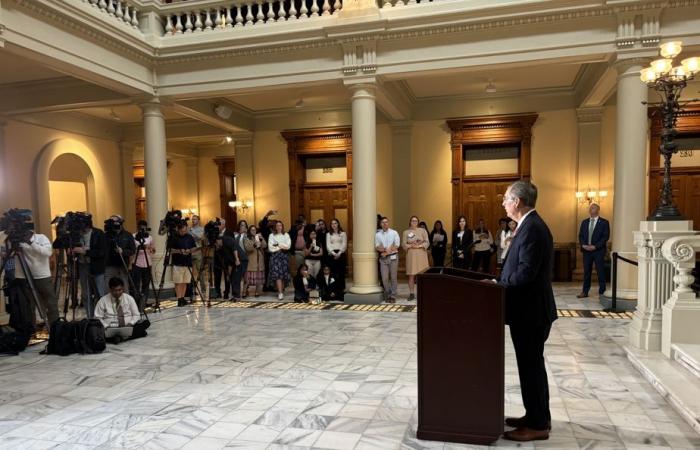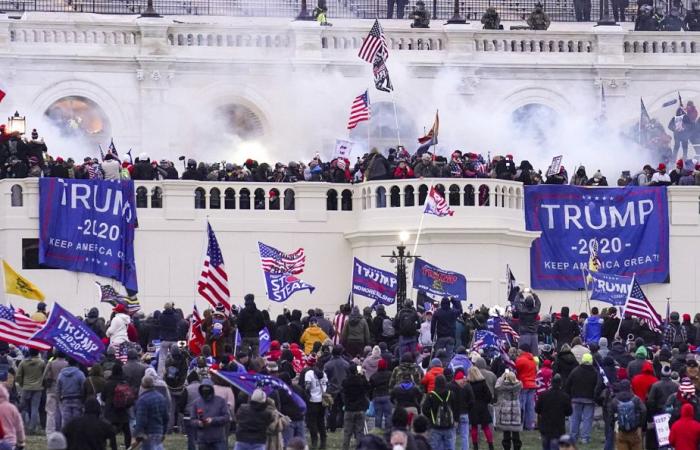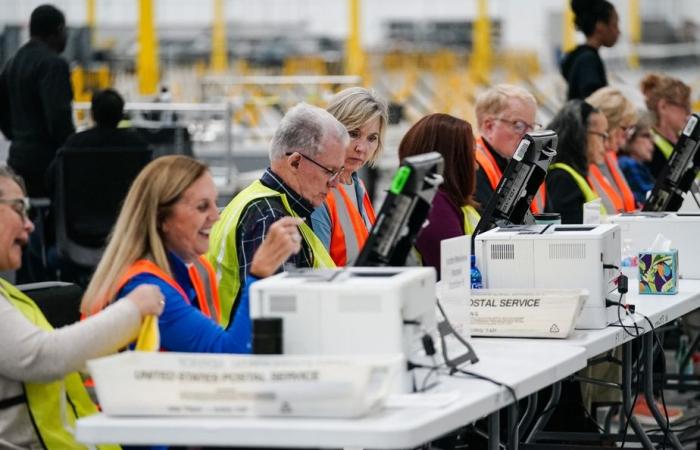In 2020, Georgia was at the heart of Donald Trump’s attempt to invalidate the result of the presidential election. There he ran into a wall he didn’t see coming. A Republican elected official who stood up to him and who, on this election day, is still on alert.
Posted at 1:36 a.m.
Updated at 5:00 a.m.
(Atlanta) In the great hall of the Georgia capitol, seat of government and legislature of the southern American state, Brad Raffensperger looks very alone behind the lectern that his team has installed for his last press conference before election day.
The mission of the Secretary of State, responsible for organizing the vote, is clear: he is there to tell the seven million Georgian voters – who could decide the fate of the American presidential race – that this Tuesday’s election will be irreproachable.
PHOTO LAURA-JULIE PERREAULT, THE PRESS
Journalists and curious onlookers listened remotely to Brad Raffensperger on Monday as he gave his last press briefing on the eve of the American election.
“In the days to come, you will see outbursts from fringe activists [pour remettre en cause l’élection]. They are very theatrical! No matter what they say, we know one thing to be true. In Georgia, it’s easy to vote and it’s difficult to cheat,” said the elected Republican, without naming the troublemakers targeted.
In front of him, an audience of journalists – from local, national and international media – listen to him from a good distance. “I find it interesting to see so many people when the election has not yet taken place. It must be said that the eyes of the nation are on Georgia and the six key states,” he emphasizes.
The 69-year-old politician neglects to say that the eyes of the United States are also on him, personally.
On January 2, 2021, Brad Raffensperger received a call from Donald Trump. Defeated by Joe Biden in the November 2020 election, the outgoing president asked the elected Republican to “find 11,780 votes”, one more than he needed to win Georgia and its 16 major voters. “I’ll have to stick to our numbers. I think they are good,” the Georgian politician replied impassively during the recorded conversation and whose Washington Post got a copy. He was supported by the state’s governor, Brian Kemp, also a Republican.
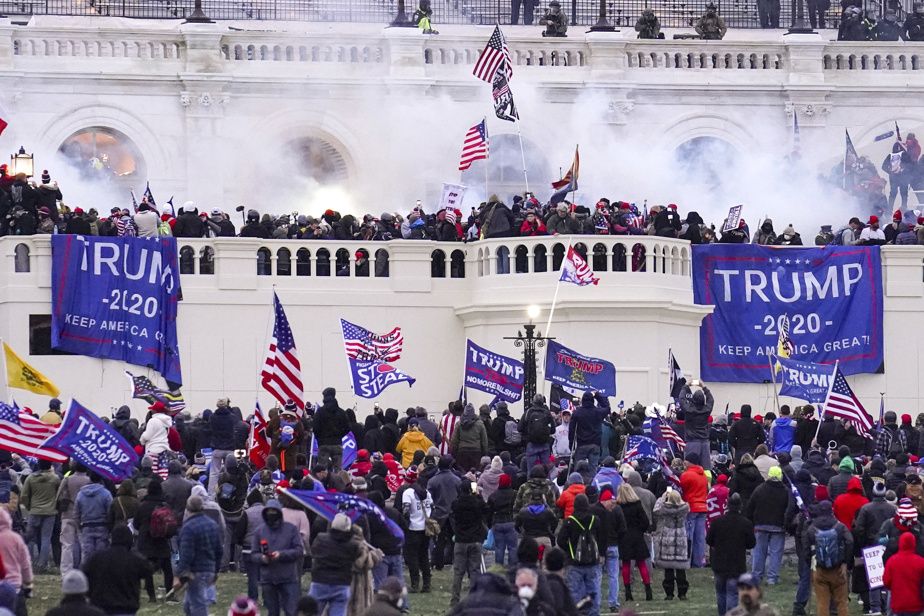
PHOTO JOHN MINCHILLO, ARCHIVES ASSOCIATED PRESS
On January 6, 2021, a horde of Donald Trump supporters stormed the Capitol in an attempt to prevent the certification of the election.
Four days later, a horde of Donald Trump supporters stormed the Capitol in an attempt to prevent the certification of the election. The call made to Brad Raffensperger became an exhibit in an impeachment process in Congress, but also in a trial in Georgia, still ongoing.
A hero in the eyes of millions of voters for having the courage to resist pressure with aplomb, Brad Raffensperger, his wife Tricia, his right-hand man Gabriel Sterling and their families were the targets of insults from Donald Trump and of threats coming from the ranks of his supporters.
“You and your family are going to be killed very slowly,” read a text message the secretary of state’s wife received more than six months after the election. One example among many.
This harassment did not prevent Brad Raffensperger from running for a second term as Georgia’s secretary of state in 2022 and winning again. When reporters asked him why he was running again, he didn’t mince his words. “If the good guys leave the field and leave the field to the bad guys, then the bad guys win,” he said at the time.
A few days later, Donald Trump announced that he would be a candidate for the Republican nomination, hoping to find his way back to the White House.
Four years have passed since Donald Trump’s phone call to Brad Raffensperger, which, in the eyes of journalist Carl Bernstein, is a scandal “much worse than Watergate” that he revealed in the Washington Post with Bob Woodward in 1972, and which led to the resignation of Richard Nixon.
Brad Raffensperger refused to look back on the past on Monday. “All this is before the courts,” he limited himself to saying.
However, he is not idle. Georgia’s election process has been in the news since three Trump followers, who believe the 2020 election was stolen, were elected to Georgia’s election board. The latter attempted to change the voting rules, but were recently rejected by judges who ruled that the new electoral rules were “illegal, unconstitutional and void”.
Brad Raffensperger, for his part, had to speak out last week to denounce a viral video which allegedly showed a Haitian immigrant preparing to vote in various Georgian polling stations with fake IDs.
This is all false and was made up by Russian trolls. We, as Americans, need to step back and make sure we are hearing the truth.
Brad Raffensperger, Georgia Secretary of State
“There are a lot of people who want us to fight against each other. We know who they are. Russia, China, Iran. There’s a whole basket of them,” the Secretary of State said on Monday, without naming the sources of disinformation coming from the United States and Donald Trump’s latest speeches, in which the candidate once again calls into question the integrity of the vote. in question, without proof.
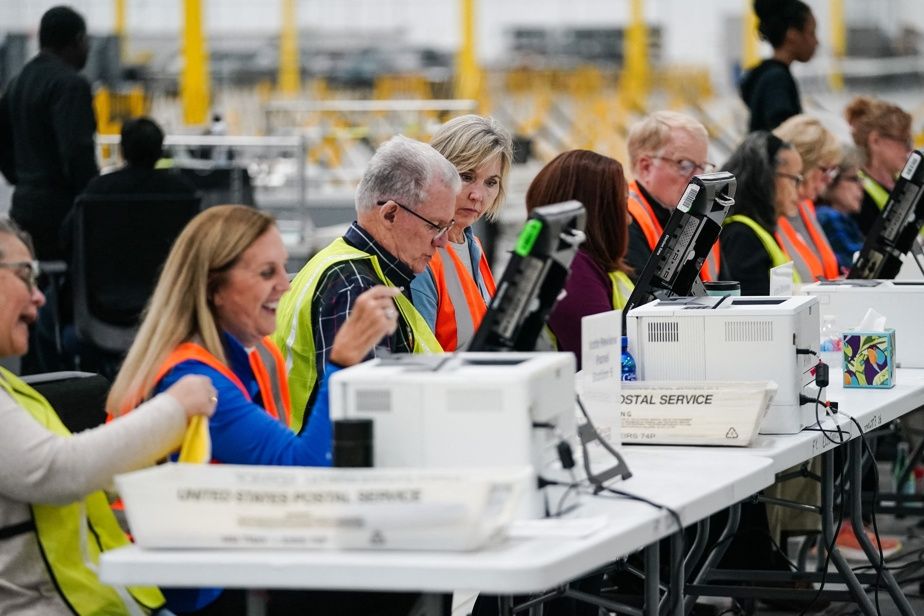
PHOTO ELIJAH NOUVELAGE, AGENCE FRANCE-PRESSE
Election workers in Fulton County, Georgia, were hard at work Monday, the eve of the big day.
Will the Georgia Secretary of State and his close associates once again be the guardrails in the event of a challenge to the vote results? “We will have a quick and fair election,” assures the main person concerned.
But he’s not the only player on the ice. At the same time, the country’s two major parties have also put in place mechanisms to keep an eye on the vote and hired armies of lawyers ready to respond to each other’s lawsuits.
The Republican Party has created a site that allows voters of their party to report suspicious events during the vote. “Georgia, help stop vote suppression, irregularities and fraud,” say ads on the internet and across the city of Atlanta.
Democrats have created a “voter protection” hotline that voters can use if they feel their rights or security are threatened. Thousands of volunteers have been trained to answer the telephone.
For its part, the major civil rights organization, the American Civil Liberties Union (ACLU), has a hotline to reach lawyers and a team of independent election observers who will be deployed across the state .
“It was in Georgia – in Atlanta – that we began our actions to protect voting rights in 1968. It’s in our DNA,” Christopher Bruce, policy director of the organization’s Georgia chapter, told me .
Is he worried to see the result of the election called into doubt on this voting day? “Our election is secure. Already 4 million people have voted early in Georgia. There’s no point in being alarmed until there’s cause for concern, but if it happens, we’re ready. »

